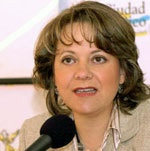
|  |  |  Editorials | Environmental Editorials | Environmental  
Is Mexico City's 'Plan Verde' a Model for Latin America?
 Is Mexico City's 'Plan Verde' a Model for Latin America? Is Mexico City's 'Plan Verde' a Model for Latin America?



| | Martha Delgado, Mexico City's Minister of the Environment |  |
As more than 2,000 city leaders gather, Marcelo Ebrard hopes his Plan Verde will inspire them to sign the Mexico City Pact.

Mexico City - Mayors of more than 2,000 cities worldwide will gather in this Latin American megalopolis next week for two summits where they will develop climate initiatives and pledge reductions in carbon emissions at the municipal level.

Mexico City’s Mayor Marcelo Ebrard aims to be more than just a good host. He wants to make an example of the ambitious climate policies he’s pushing to transform the sprawling, polluted capital city into a green urban leader.

At both the Third World Congress of United Cities and Local Governments (UCLG), a three-day event that kicks off Nov. 16, and the World Mayors Summit on Climate Change on Nov. 21, Ebrard is likely to reiterate a stance he has held throughout his four years in office: Cities need a stronger voice in global climate talks.

The mayor’s own climate policies reflect that. Ebrard’s 15-year Plan Verde, or Green Plan, is a $1 billion-per-year investment to develop new transport, water, waste, land conservation and alternative energy programs in Mexico City. (The Clinton Global Initiative has proposed $200 million in funding to support the project.) The plan’s $5.4 billion Climate Action Program aims to reduce the city's carbon dioxide emissions by 7 million tons - about 12 percent - from 2008 to 2012. It is heralded as the only plan of its kind in Latin America.

“For us, hosting this conference gives recognition to Mexico City as a city that has promoted a very important policy in climate mitigation,” said Martha Delgado, Secretary of the Environment for the Federal District, the city proper that nearly 9 million people call home. More than 21 million people live in the entire Mexico City sprawl.

“The cities, and their governors and mayors, are the authorities who confront the problems we live through related to climate change…so mayors are the most concerned about climate change,” said Delgado.

Mexico City Pact Would Bind Cities to Emissions Reductions

Following the congress, municipal leaders will have the chance to sign The Mexico City Pact (formerly the Global Cities Covenant on Climate) at the World Mayors Summit on Climate Change on Nov. 21, an event co-organized by Ebrard, the summit chair, and ICLEI, or Local Governments for Sustainability.

The pact calls for city leaders to propose binding targets for reducing carbon emissions and to publicly report their progress to the Carbonn Cities Climate Registry, a tracking system to be launched at the summit and run from Bonn, Germany.

“The pact is the first of many steps that local governments intend to pursue precisely to contribute to mitigating climate change and, at the same time, to establish specific goals and measures and look for the necessary financing to develop these projects,” said Edgar Villaseñor Franco, the executive director of ICLEI in Mexico.

“Local governments can no longer wait for an international agreement to move things along,” he said. “So, why can’t we create the tools and mechanisms in a way that allows us to commit to reductions with clear and concrete goals? This is what ICLEI and Mexico City’s government have designed and created” with the Carbonn registry.

ICLEI’s membership of 1,500 cities includes the 40 urban centers that participated in the C40 Cities Climate Leadership Group conference held earlier this month in Hong Kong, although the two organizations and events are independent.

Boosting Subways, Buses and Bikes to Lower Emissions

Mexico City’s plan includes public transportation expansions intended to reduce greenhouse gas (GHG) emissions. A 12th line for the Metro subway system - a $1.8 billion project - aims to carry 375,000 passengers along 16.5 miles of track upon completion April 2012.

Construction on the third and fourth lines of the Metrobus, the city’s award-winning bus rapid-transit (BRT) system, is underway, and ridership could double to 1 million with the addition of a looped route in the historical city center.

The public bike-sharing program Ecobici is set to add 85 bike stations to the existing 90 by early next year, and on Nov. 20, the city will inaugurate freshly paved bike lanes, or ciclovías, along the traffic-clogged Reforma thoroughfare in the heart of the city.

Delgado said the city also plans to add a second “Zero Emissions” corridor to its current fleet of 120 electric trolleybuses and will introduce 500 electric Nissan cars into its taxi fleet by late 2011. Already some 70,000 exhaust-spewing taxis have been replaced with newer, more fuel-efficient models.

The city recently set Dec. 31, 2011 as the deadline to close the Bordo Poniente landfill, a dump that releases around 1.5 million tons of methane per year. The plan is to capture these biogases and convert them into electric energy.

Other Plan Verde initiatives include urban gardens and compost piles for 15 middle-class apartment complexes. Proposed collection centers would allow residents to sort, clean and resell recyclable materials to local industries.

Ambitious Plans, but an Array of Obstacles

For all these carefully spelled-out details, Ebrard’s green plan faces an array of obstacles before it can truly become a global municipal model, said José Luis Lezama, director of the Center for Demographic, Urban and Environmental Studies (CEDUA) at El Colegio de México.

“In the Climate Action Program, for now many of the projected projects are not necessarily being carried out, and the plan lacks certain measures for adaptation,” he said.

He noted that more than half of the program’s 44 elements focus on mitigating the effects of global warming, rather than help higher-risk populations, such as lower-income families displaced by heavy flooding in outlying neighborhoods, adjust to the effects of climate change.

“Mexico has the possibility to become a leader [in climate initiatives] if Ebrard carries out effective public works that have significant impacts,” he said. “The actions necessary to achieving these goals aren’t taking place, in the sense that in Mexico - in both the city and country - the fundamental problem is that there is no obligation to reduce GHG emissions. As long as everything stays in proposals, we won’t be able to achieve real reductions in emissions.”

Villaseñor Franco said that the Plan Verde’s projects are often hindered by a lack of financing from national and global institutions - Ebrard says that 90 percent of local green projects worldwide are funded by city budgets - and a range of urban development issues, such as a failing public water system and large economic disparities between the central and bordering neighborhoods.

“Many Mexican cities grew in a disorderly fashion, and so, even if you wanted to do things now, you have to first solve previously created problems. You have to dedicate time and resources to fix these issues…and that delays the delivery of good [climate] projects,” he said.

Roberto Remes, director of public transport for the Institute of Transportation and Development Policy (ITDP) in Mexico, said the growth of mass transit systems in Mexico City has been slow due to budgeting and bureaucratic holdups. The fourth Metrobus line, for example, has no set target for completion, and work on the 12th Metro line has stalled as Ebrard petitions for an additional $326 million from the federal government to finish construction.

ITDP supervises Ebrard’s government on public and nonmotorized transportation initiatives. Walter Hook, the institute’s international director, will participate in a panel at the upcoming World Mayors Summit.

Remes, however, added that despite its complications, the mayor’s climate agenda has been positive in boosting citizen participation and changing, albeit slowly, the collective mindset to one that rides bikes and takes buses rather than drives cars. He said that by signing The Mexico City Pact on Nov. 21, global city governments could support one another in consolidating similar local green plans.

“[The pact] makes it so that cities can agree on what to do collectively…and align themselves to the right policies,” he said. “It refines the machinery so that everyone sees clearly where things are going.” |

 |
|  |



